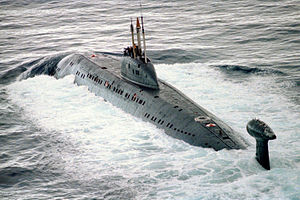|
Soviet submarine K-324
K-324 was a Soviet Navy Victor III-class submarine in reserve since 1997. It was assigned to the Northern Fleet. Service historyK-324's keel was laid down on 29 February 1980 at Komsomolsk Shipyard in Komsomolsk-on-Amur in the Russian Far East. It was launched on 7 October 1980 and commissioned on 30 December 1980. It was the seventh submarine of the class built at Komsomolsk. CollisionIn 1981, K-324 collided with an unidentified submarine of the Sturgeon class, purportedly USS Drum, in Peter the Great Bay, not far from Vladivostok.[1] The submarine was heavily damaged, to all reports. The United States government denied any of their submarines were in the area, and no US submarine reported any damage during that time period, but the Soviets reported none of their submarines were in the Bay aside from K-324.[citation needed] Fleet transfer and operationsK-324 transited across the Arctic in November and was officially transferred to the Northern Fleet on 3 December 1982. Disabled On 31 October 1983, K-324 snagged the US frigate USS McCloy's towed sonar array cable[2] 282 miles (454 km) west of Bermuda, causing damage to the submarine's propeller. The submarine was towed to Cienfuegos, Cuba for repairs by a Soviet salvage ship beginning on 5 November.[3] Soviet technicians recovered some parts of McCloy's array.[4] Later activities and decommissioningK-324 was again involved in operations around US waters in 1985. She was reported to have detected American SSBNs on three occasions, tailing them for 28 hours. K-324 took advantage of temperature variations in the Gulf Stream.[5] K-324 was in reserve by 1997.[6] K-324 was written off in 2000 for scrapping. References
External links |
||||||||||||||||||||||||||||||||||||||||
